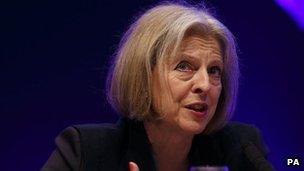Theresa May pledges modern-day slavery crackdown
- Published

Mrs May says the government can and will eliminate modern-day slavery in the UK
Tougher sanctions are to be brought in to tackle modern-day slavery in the UK, Home Secretary Theresa May has said.
Writing in the Sunday Times, external, Mrs May said a new law would be introduced in this session of parliament.
An order banning someone convicted of trafficking from being a gangmaster after their release from prison would form a key part of the bill, she said.
Labour have welcomed the move, but say more support is needed for trafficking victims, especially children.
The home secretary said while it was "scarcely believable" there was slavery in Britain, the "harsh reality" was there were people in the UK "forced to exist in appalling conditions, often against their will".
"Vulnerable people from all over the globe are trafficked into Britain every day," she said.
"Most end up working as modern-day slaves, without pay, without rights and without hope."
Adding that there had also been cases of British people being trafficked within the UK and "kept as slaves", Mrs May said that whatever their nationality, "our first concern must be to free them".
But she said the only way to reduce the number of victims was to "maximise the number of modern-day slave drivers we convict and imprison".
'Profound shock'
Gangmasters are individuals who supply large numbers of workers for agriculture, forestry, horticulture, shellfish-gathering or food processing and packaging.
Since the deaths of 23 Chinese cockle-pickers in Morecambe Bay in 2005, all gangmasters have been required to be members of the Gangmasters Licensing Authority (GLA).
Mrs May said the government's Modern Slavery Bill would contain new anti-trafficking measures, including:
Trafficking prevention orders, to prevent a person convicted of a trafficking offence from gaining a GLA membership, place restrictions on their ability to own a company, visit certain places or work with children or young women
Seek a commitment from companies not to use slave labour
Create the role of modern slavery commissioner, who would hold law enforcement and government bodies to account
"It has been a profound shock to discover the extent to which slavery has reappeared in our country," Mrs May said.
"We can and we will eliminate it - providing everyone at every level of society does what they can to help.
"No man, woman or child should be left to suffer through modern slavery."
The home secretary said tackling trafficking would be one of the "highest priorities" for the new National Crime Agency, which will take over the responsibilities of the Serious and Organised Crime Agency and other UK-wide law enforcement bodies from October.
Mrs May's proposal follows comments made by Prime Minister David Cameron in April, when he promised the government would take a "really concerted approach to crush it, to stamp it out and... take a criminal approach to those who are the traffickers".
Shadow home secretary Yvette Cooper told the BBC Labour had been calling for tougher action since 2010.
"Until now the government has resisted calls to take action on trafficking. Theresa May initially refused to join the EU directive on Human Trafficking and only did so after pressure from Labour and others in Parliament and from campaign groups," Ms Cooper said.
"Stronger action against traffickers is welcome. But the proposals also need to include stronger action and enforcement against gangmasters and employers, and more support for trafficked victims, especially children and young people.
"Ministers also need to address trafficking within Britain as well as across borders. This legislation is an important opportunity that must not be missed."
- Published2 August 2013
- Published29 July 2013
- Published18 July 2013
- Published2 July 2013
- Published17 June 2013
- Published7 June 2013